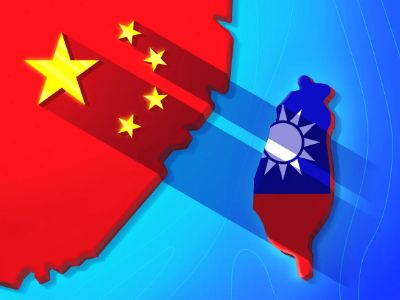
China: We reserve the right to use force against Taiwan as a last resort in compelling circumstances
-
Published: 15 October 2022

Less than a week after a statement by the President of Taiwan, Tsai Ing-wen, saying that an armed confrontation between Taiwan and China was "not an option at all," a
spokesman for the Chinese Communist Party said today that China reserves the right to use force against Taiwan as a last resort in compelling circumstances, although peaceful reunification is its first option.
He told a press conference in Beijing that the reunification of China and Taiwan was in the interests of all, including Taiwan's citizens
In her National Day address, the President of Taiwan said "I want to make it clear to the Beijing authorities that armed confrontation is not an option at all for both sides, there will be no basis for resuming constructive interaction across the Taiwan Strait only by respecting the commitment of the Taiwanese people to our sovereignty, democracy and freedom", according to Reuters.
China calls Tsai, who was overwhelmingly re-elected in 2020 on a promise to stand up to Beijing, a "separatist" and refuses to speak to her.
An official familiar with Tsai's thinking, on condition of anonymity, told reporters that the President looked forward to "clearly conveying her position" to the world and to Beijing.
"The current status quo of peace and stability in the Taiwan Strait is the main focus of Tsai's comments on cross-Strait relations this year," the official said.
Tsai made strengthening Taiwan's defences a cornerstone of its administration to enable it to acquire stronger means against China, which was intensifying an ambitious modernization programme for its military. Tsai said that Taiwan would show the world that it had a responsibility to defend itself.
Taiwan was increasing the production of precision-guided missiles and high-performance naval vessels and was working to acquire fast-moving small arms that would ensure Taiwan's full readiness to respond to "external military threats".
Military tension has raised concerns, especially in the United States, due to the concentration of Taiwan's electronic chip industry.
"I want to specifically emphasize one point to citizens and to the international community, namely, that Taiwan's semiconductor sector is not in danger," Tsai said.
"We will continue to maintain Taiwan's advantages and capability in leading semiconductor manufacturing processes, and help restructure the global semiconductor supply chain, giving Taiwan semiconductor companies a more important global role."
The Chinese Foreign Minister warned on September 24 to "crush" those trying to block China's unity.
The Minister said that any attempt to block China's unification would be "crushed" under the wheels of history.
The Chinese representative's warning came after Chinese Foreign Minister Wang Yi, addressing the United Nations General Assembly, stressed that the world should promote peace and oppose war.
"The one-China principle is a fundamental rule in our international relations."
Wang Yi also noted that his country was seeking "a global consensus on development and the preservation of the rights of all States through equitable partnership", stressing that no State should use its authority to bully smaller or poorer nations.
The world's nations must facilitate free trade and ensure a globally open economy and achieve sustainable and collective security through compliance with United Nations principles.
